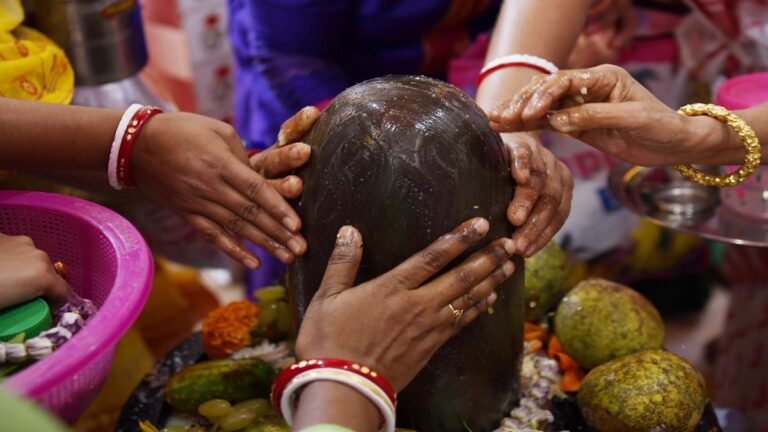Fasting rituals for Maha Shivratri 2024: Maha Shivratri, the “Great Night of Shiva”, is an important Hindu festival celebrated on the 14th day of the dark fortnight (Krishna Chaturdashi) of the Hindu month of Phalguna. This year it will be Friday, March 8th. Believers celebrate this day with devotion and often observe special fasts.
In the Hindu Shaivist tradition, Shiva is considered the supreme god and is revered for his role as the destroyer of evil and transformer of the universe. Lord Shiva is also recognized as the god associated with meditation, yoga, and art.
Also read:Maha Shivaratri 2024: Best 5 Food Recipes for Vrat
Maha Shivratri, the night dedicated to Lord Shiva, is considered very auspicious and is associated with the sacred Tandava dance, a symbol of the eternal cycle of creation, preservation and destruction. Devotees traditionally celebrate the occasion by visiting Shiva temples and offering 'bilva' leaves, milk, honey and water to the lingam, a divine symbol of purity and unwavering devotion.
As Mahashivratri approaches, millions of worshipers are preparing to perform fasting rituals in honor of Lord Shiva. Fasting is a spiritual practice and must be approached with wisdom and care to ensure a meaningful and fulfilling experience.
Here are some do's and don'ts to ensure you have a fulfilling and spiritually enriching Mahashivratri fast.
Also read:Maha Shivratri 2024: Puja Vidhi, rituals, timing and celebrations
How to fast on Maha Shivratri:
Wake up early: The fasting day should begin by waking up early, two hours before sunrise, commonly called Brahma Muhurta. Before you start fasting, set a sankalp (intention) for the day. Declare your devotion to Lord Shiva and your vow to observe the fast sincerely and purely.
Cleanliness: After waking up, take a bath and put on clean clothes, preferably white. Pledge of devotion and devotion (sankalp). Choose auspicious colors such as red, pink, and yellow and choose clean and comfortable clothes.
Select sattvic food: Choose satvik (pure) foods like fruits, nuts, dairy products, and vegetables while fasting. These foods are believed to raise spiritual vibrations and keep the body light.
Stay hydrated: Fasting does not mean ignoring your body's hydration needs. Drink plenty of water, coconut water, and herbal tea throughout the day to stay hydrated and maintain energy levels.
Chant mantras and prayers. Participate in reciting the Lord Shiva mantra and praying. This not only keeps your mind focused on the spiritual aspects of the day, but also adds positive vibrations to your surroundings. It is recommended to chant 'Om Namah Shivaya' throughout the day for spiritual focus.
Bilva leaves and milk are offered to Shiva Lingam. As part of the evening rituals, Bilva leaves and milk are offered to the Shiva Lingam. This symbolizes purity, devotion and the auspicious connection of the believer with God.
Respect and restraint: To maintain purity during fasting, refrain from harsh words, anger, and disrespectful elders.
Timing of breaking the fast: To maximize the benefits of fasting, it is recommended to break the fast between sunrise and before the end of Chaturdashi Tithi, as per the Drikpanchan guidelines.
What not to do on Maha Shivratri fast:
Avoid non-satvik foods: Avoid consuming non-satvik foods like onions, garlic, and grains during fasting. These are considered to disrupt spiritual energy and are usually avoided in traditional fasting practices.
Limit your salt intake: It is recommended that you limit your salt intake during the fasting period, as excessive salt intake can lead to dehydration. Choose rock salt (Sendha Namak) as per your requirement.
Offerings: Avoid offering vermilion (sindoor/kumkum) or coconut water to the Shivalinga. Additionally, refrain from offering tulsi (holy basil) leaves as they are traditionally associated with Lord Vishnu.
Complete Parikrama: As per the Shiva Purana, make a half-parikrama (circle) around the Shiva Linga.
Stay away from distractions: Use this day for spiritual reflection and focus on your connection with Lord Shiva. Minimize distractions such as TV, social media, and unnecessary conversations.
Avoid overeating after breaking your fast. When breaking your fast, start with foods that are light and easy to digest. Eating too much or consuming heavy meals right after fasting can put a strain on your digestive system.
Refrain from negative thoughts. Mahashivratri is a spiritually important day. Avoid negative thoughts, gossip and criticism. Maintain a positive and uplifting mindset throughout the day.
Intoxicants: Avoid alcohol, tobacco, and other intoxicants while fasting.
food: The level of severity of fasting varies, but avoid grains, legumes, and foods considered tamasic, which are thought to increase negative qualities.
Observing Maha Shivratri through fasting can be a transformative and spiritually uplifting experience. By following these guidelines, devotees can ensure that the ritual of fasting is not only physically beneficial but also spiritually fulfilling and fosters a deeper connection with Lord Shiva. May this Maha Shivratri bring peace, prosperity and divine blessings to all.


